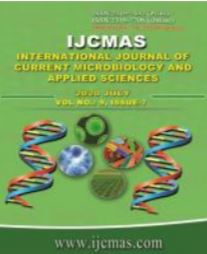


 National Academy of Agricultural Sciences (NAAS)
National Academy of Agricultural Sciences (NAAS)

|
PRINT ISSN : 2319-7692
Online ISSN : 2319-7706 Issues : 12 per year Publisher : Excellent Publishers Email : editorijcmas@gmail.com / submit@ijcmas.com Editor-in-chief: Dr.M.Prakash Index Copernicus ICV 2018: 95.39 NAAS RATING 2020: 5.38 |
The study was taken up with the objectives of profiling income generating activities of farm families and identifying points of interventions; conducting micro level studies to identify gender concerns and technological gaps in doubling farm income; implementing technological modules for enhancing productivity with an aim to enhance farm income with emphasis on integrating gender roles and to study the impact of the interventions to develop a gender-sensitive model for doubling farmers' income. The study was taken up in a cluster of 50 farm women from selected villages in Nimapara block of Puri district in Odisha during 2017-2020. A gender sensitive model to enhance farmers’ income by addressing gender concerns and technological gaps was developed. The gender perspectives were integrated by way of assessment of gender concerns in accessing productive resources and extension services among the farm families, counselling and gender sensitization of the community, and promoting community organizations such as knowledge groups of men and women. Team of experts analyzed the technological and developmental gaps and designed need based technological modules. The need based modules were implemented through training, demonstrations, capacity building programmes, input support and advisory services, and promoting high yielding varieties and hybrids. The impact of the field level capacity building and technology transfer programmes could be realized in terms of enhancement of annual farm income from Rs. 89,300/- to Rs. 1,51,200/- (69% enhancement), and cash in hand among farm women (mean annual savings) from Rs. 18,000/- to Rs. 42,000/- (113% enhancement) between 2017-18 to 2019-20. The focus area and the extension strategies for gender mainstreaming and improving livelihood are also discussed in this paper.
 |
 |
 |
 |
 |